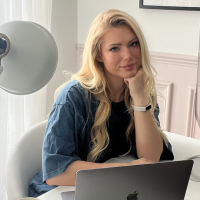Jemma Roedel Interview Published on: 25, Nov 2024
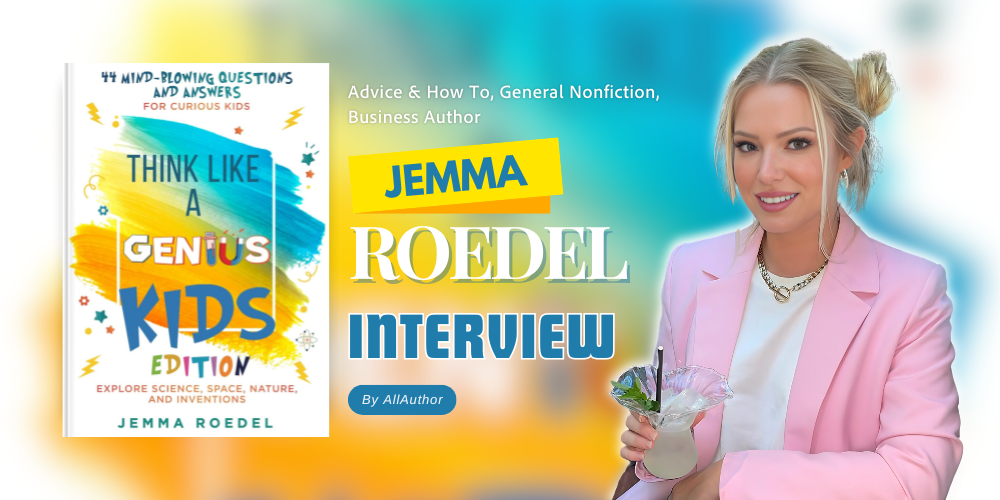 Your journey is incredibly inspiring. What key moments in your life do you think shaped you into the leader and advocate for women that you are today?
Your journey is incredibly inspiring. What key moments in your life do you think shaped you into the leader and advocate for women that you are today?
I’ve definitely experienced some pretty bad leadership in previous roles, which pushed me to be the exact opposite of what I had gone through. Seeing how women can be treated especially in male-dominated industries, when they’re just as skilled, opened my eyes to the need for change. And I’m not alone—so many women have shared similar experiences with me. Environments like that can really chip away at your confidence if you’re not careful. These experiences motivated me to create spaces where women can thrive and not have to constantly prove themselves or feel diminished. I knew I wanted to be a voice for them, showing that there’s a different way to lead and lifting others along the way.
Your work centers on empowering women. What do you think is the biggest barrier women face when stepping into leadership roles, and how can they overcome it?Confidence and communication are huge, but I think imposter syndrome takes the top spot. Women often feel they have to be 200% prepared for any role, doubting themselves even when they’re completely qualified. They end up downplaying their achievements or staying quiet because they don’t want to appear too assertive. Overcoming this starts with realizing that no one is 100% confident all the time—it’s normal to have doubts. Building confidence through small wins, putting yourself out there, and learning to value your unique perspective are essential steps. And it helps to remember: leadership isn’t about perfection, it’s about progress.
You’ve expanded from writing adult leadership books to children's books that teach business skills. What motivated this shift, and how do you approach writing for such different audiences?Writing for adults is definitely a different ballgame—it’s a deeper, more research-heavy process that requires a lot of focus. My first book was written during the pandemic, when I had a little more time to really dive in. Writing for kids, on the other hand, feels like a breath of fresh air! It's a lighter, more playful process, and it’s so much fun to make these big ideas accessible to young minds. Plus, since having my baby, I’ve naturally gravitated toward children’s books. “Baby brain” struck hard, and I ended up creating books that I’d want my own child to read. Now that I’m about four months postpartum, I’m slowly getting back into a routine. (Like answering these questions during nap time) For 2025, my New Year’s resolution is to complete an adult-focused project I started before pregnancy and pick up where I left off!
What key lessons do you hope young readers take away from your children's books, and how do you think these lessons will shape their future?I want kids to have the same ambition and curiosity I was lucky enough to grow up with. I was always creative and entrepreneurial, but back then, there weren’t a lot of resources for kids with big ideas. My children’s books are all about giving young readers the confidence to explore their interests and find fun ways to learn about business. I would have loved to have these kinds of books when I was younger, especially my activity book range. My hope is that these lessons show kids they can start small and make things happen at any age.
You manage two successful companies alongside your writing career. How do you balance your responsibilities as an entrepreneur and an author?It’s not easy—balancing everything feels like a swinging pendulum. I’ve learned to accept that I can’t be 100% focused on everything all at once. So I let one business take the spotlight for a while, while the other hums along in the background. It’s all about accepting that progress doesn’t always happen on my ideal timeline, but as long as I’m moving forward, I’m happy. The main thing is to keep going, even if it's one small step at a time.
Can you share some of the challenges you’ve faced as a female entrepreneur, and how you overcame them?When I wrote my first leadership book, I faced a lot of criticism, even from people close to me who didn’t think I was “qualified” to speak on the topic. I felt like I was stepping into unknown territory, but I knew I had something to say. I speak to women in new roles, and I talk about the struggles we all know deep down, but that we don’t always have the confidence to voice. Writing this book was my way of telling other women, “You can do this too.” I didn’t need a fancy title or degree to write a book—I just compiled what I felt was valuable, and it resonated. Nearly 100,000 copies sold later, I’m incredibly grateful that I pushed through.
Mentorship is a core part of your work. What role do you think mentors play in empowering women, and how can women find the right mentor for their journey?Mentors are huge. They’ve been through what you’re going through, and they have the advice that can help you skip a lot of the trial-and-error. Having someone who’s been there and done that can save you so much time and energy. I always tell women to look within their industry or even in professional groups for someone who inspires them, and to be open to learning from others' experiences. The right mentor can be a game-changer, not just in your career but in your confidence and vision, too.
With such a focus on building self-confidence in women, what daily habits or practices do you recommend to maintain a strong sense of confidence and self-worth?I’m big on reflection. Take a moment to look back on how far you’ve come—even if it’s just a year ago—and celebrate that progress. Especially now with a baby, juggling everything can feel overwhelming, but setting small, achievable goals each day and acknowledging each success makes a world of difference. Little wins add up, and they’re a reminder that progress is happening, even if it’s slower than I’d like.
Your books are known for offering a fresh perspective on leadership. What do you believe sets female leadership apart, and how can women embrace their unique strengths?Female leadership often includes a strong focus on empathy, resilience, and collaboration. Women bring a unique approach that balances strength with understanding, and I think it’s something we should embrace. When women lead, they often create environments where people feel heard, valued, and motivated to do their best work. I encourage women to tap into these natural strengths and use them to create positive, inclusive spaces.
What advice would you give to women who aspire to write their own book or start a business but are unsure of where to begin?Start small if you’re not sure where to begin—sometimes breaking it down makes all the difference. For writing a book, I genuinely believe anyone can do non-fiction if they take it step-by-step. First, think about your topic, then create a basic outline by listing the chapters. From there, take each chapter and break it down further. Editors are incredibly helpful when it comes to refining the tone and flow, so don’t worry about perfection; just focus on getting your ideas down.
When it comes to starting a business, lean into the skills and passions you already have. Let’s say you work in finance but love events—try helping a friend plan an event and build on that experience. Take pictures, document your work, and build a little portfolio. Help someone else, maybe even for free, to build your confidence and credibility. With each step, you’re gaining real experience and creating a base for your first paying client. Start by working on projects alongside your main job; these small steps can get you closer to turning that passion into something full-time. Slow and steady progress is still progress, and that foundation will give you the momentum to go further.
How do you incorporate your own entrepreneurial experiences into your books, both for adults and children?For children’s books, I include some themes I remember from my own childhood—like earning pocket money through little jobs. My siblings and I would make leaflets to hand out, advertising our car-washing and ironing services. That early sense of entrepreneurship started with questions like, “How can I earn more allowance?” That mindset of finding creative ways to earn has been with me ever since, and I hope it inspires kids today to explore their own ideas.
As someone who has broken down barriers in both literature and business, how do you stay motivated, and what keeps you passionate about your mission?Honestly, getting emails and messages from real people who read my books is what keeps me going. It’s easy to forget that actual people are reading my work since so much of it is online, and sometimes it feels like a task on my to-do list. But when I get those messages, it’s like everything comes to life—I’m reminded that my words have reached people, and that’s pretty incredible.
It’s also the rapport I have with my clients that keeps me grounded and inspired in my business. Their appreciation and support mean the world to me, and many have become friends along the way. When we chat, it brings me back to why I love this work, and it always opens up new avenues to explore and learn about. These relationships remind me that my work isn’t just about business; it’s about real connections and mutual growth. Seeing my books spark discussions, bring women together, and support others in their journeys keeps me passionate and motivated to keep writing, working, and connecting.
"She Thinks Like a Boss" was a breakthrough success. What inspired you to write a book focused on leadership for women, and how did you feel when it became a bestseller?Bad leadership in my last role was a big push for me. I just couldn’t believe how toxic the environment was, and I felt compelled to write something that showed a better way. I wanted to lift women up, especially those who felt their confidence had been knocked down. When it became a bestseller, it was incredibly rewarding and reaffirmed the need for this message. It showed me I wasn’t alone in these experiences, and that was powerful.
Looking to the future, what new goals or projects do you have in mind, both in terms of writing and your business ventures?Lately, I’ve been rethinking what “success” really means to me, and I’ve realized it’s all about freedom and balance. My focus now is actually working toward doing “less”—less busy work and more meaningful, fulfilling projects. I want to enjoy the freedom to travel, spend quality time with my family, and still stay financially secure while doing work I genuinely love.
There’s a big trend right now toward online courses, but honestly, that’s not my style. I’m extroverted in person but more reserved online, so video content just isn’t my comfort zone. Recording myself can be a whole ordeal, whereas my partner can do it in 30 seconds! Writing, on the other hand, feels natural and allows me to work at my own pace. I’ve found that a balance between writing and my other business—where I get to connect face-to-face with clients—keeps me grounded and inspired. If I can keep creating books, stay somewhat behind the scenes, and maintain a flexible, part-time schedule with my clients, then that’s my ideal.
So, for now, my main goal is to finish my next adult book for 2025. And if time allows, I’d love to add another children’s book to my collection—thanks to my amazing illustrator who brings my ideas to life! For me, the goal is the freedom to take a road trip with my family for a month, working remotely and enjoying the journey along the way.
How did you first come across the AllAuthor website? What do you like or dislike about the site?I discovered AllAuthor while exploring new ways to promote my work. It’s a fantastic platform for connecting with readers on a personal level, and I’ve enjoyed its features. I’d love to explore it more in the future to maximize its potential.
Jemma Roedel is an acclaimed author and successful entrepreneur based in the UK, renowned for her work in empowering women and building self-confidence. Her breakthrough book, “She Thinks Like a Boss: Leadership”, quickly became an Amazon bestseller, resonating with women worldwide by offering a fresh perspective on leadership and inspiring them to embrace their strengths. Through her writing, speaking, and mentorship, Jemma is making a lasting impact on the future of female empowerment.
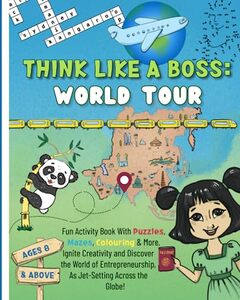 Think Like a Boss: World Tour: Career-themed Fun Activity Book with an Interactive Story. Discover Designing, Vision, & Entrepreneurship with Engaging ... Coloring, Puzzles, Mazes, Crosswords & More!
Genre: Advice & How To, Business
Think Like a Boss: World Tour: Career-themed Fun Activity Book with an Interactive Story. Discover Designing, Vision, & Entrepreneurship with Engaging ... Coloring, Puzzles, Mazes, Crosswords & More!
Genre: Advice & How To, Business
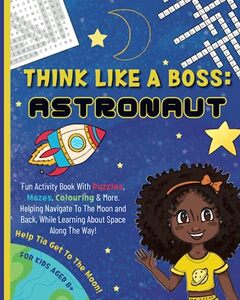 Think Like a Boss: Astronaut: Career-themed Fun Activity Book with an Interactive Story. Discover Designing, Vision, & Entrepreneurship with Engaging ... Coloring, Puzzles, Mazes, Crosswords & More!
Genre: Children's, Advice & How To
Think Like a Boss: Astronaut: Career-themed Fun Activity Book with an Interactive Story. Discover Designing, Vision, & Entrepreneurship with Engaging ... Coloring, Puzzles, Mazes, Crosswords & More!
Genre: Children's, Advice & How To
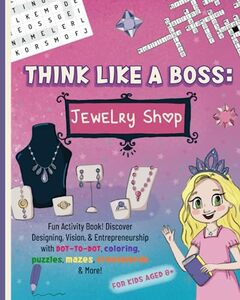 Think Like a Boss: Jewelry Shop: Career-themed Fun Activity Book with an Interactive Story. Discover Designing, Vision, & Entrepreneurship with ... Coloring, Puzzles, Mazes, Crosswords & More!
Genre: Children's, Advice & How To, Business
Think Like a Boss: Jewelry Shop: Career-themed Fun Activity Book with an Interactive Story. Discover Designing, Vision, & Entrepreneurship with ... Coloring, Puzzles, Mazes, Crosswords & More!
Genre: Children's, Advice & How To, Business
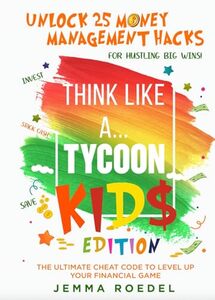 Think Like a Tycoon: Kids Edition : Unlock 25 Money Management Hacks for Hustling Big Wins! Stack Cash, Save, & Invest with the Ultimate Cheat Code to Leveling Up Your Financial Game!
Think Like a Tycoon: Kids Edition : Unlock 25 Money Management Hacks for Hustling Big Wins! Stack Cash, Save, & Invest with the Ultimate Cheat Code to Leveling Up Your Financial Game!
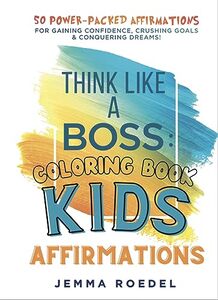 Think Like a Boss: Kids Affirmations: Brain Fuel for Kidpreneurs - 50 Power-Packed Affirmations for Gaining Confidence, Crushing Goals & Conquering Dreams Filled with Positivity, Imagination and Fun!
Genre: Teen & Young Adult, Children's
Think Like a Boss: Kids Affirmations: Brain Fuel for Kidpreneurs - 50 Power-Packed Affirmations for Gaining Confidence, Crushing Goals & Conquering Dreams Filled with Positivity, Imagination and Fun!
Genre: Teen & Young Adult, Children's
 Ella Piensa como Jefa: Liderazgo: 9 Habilidades Esenciales para las Nuevas Mujeres Líderes en el Mundo Empresarial y Laboral. Cómo Influir en los Equipos ... el Síndrome del Impostor (Spanish Edition)
Genre: Advice & How To, Business
Ella Piensa como Jefa: Liderazgo: 9 Habilidades Esenciales para las Nuevas Mujeres Líderes en el Mundo Empresarial y Laboral. Cómo Influir en los Equipos ... el Síndrome del Impostor (Spanish Edition)
Genre: Advice & How To, Business
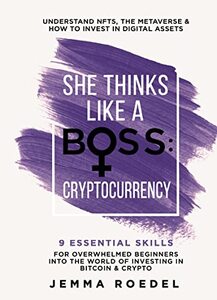 She Thinks Like a Boss: Cryptocurrency: 9 Essential Skills for Overwhelmed Beginners into the World of Investing in Bitcoin & Crypto. Understand NFTs & ... & How to Invest in Digital Assets.
Genre: Advice & How To, General Nonfiction, Business
She Thinks Like a Boss: Cryptocurrency: 9 Essential Skills for Overwhelmed Beginners into the World of Investing in Bitcoin & Crypto. Understand NFTs & ... & How to Invest in Digital Assets.
Genre: Advice & How To, General Nonfiction, Business
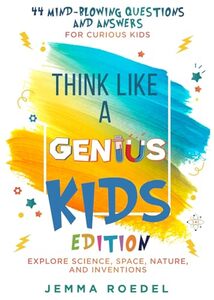 Think Like a Genius: Kids Edition : 44 Mind-Blowing Questions & Answers for Curious Kids – Explore Science, Space, Nature, and Inventions (Think Like a Boss)
Genre: Children's, Advice & How To, General Nonfiction
Think Like a Genius: Kids Edition : 44 Mind-Blowing Questions & Answers for Curious Kids – Explore Science, Space, Nature, and Inventions (Think Like a Boss)
Genre: Children's, Advice & How To, General Nonfiction
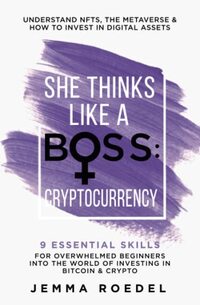 She Thinks Like a Boss: Cryptocurrency: 9 Essential Skills for Overwhelmed Beginners into the World of Investing in Bitcoin & Crypto. Understand NFTs & the Metaverse & How to Invest in Digital Assets.
Genre: Advice & How To, General Nonfiction, Business
She Thinks Like a Boss: Cryptocurrency: 9 Essential Skills for Overwhelmed Beginners into the World of Investing in Bitcoin & Crypto. Understand NFTs & the Metaverse & How to Invest in Digital Assets.
Genre: Advice & How To, General Nonfiction, Business
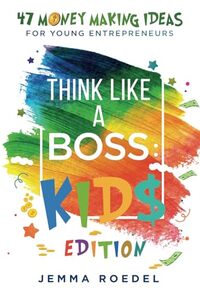 Think Like a Boss: Kids Edition: 47 Money Making Ideas for Young Entrepreneurs, Earn Key Skills for Future Job Success in the Workplace or in Business. Helping Kids Learn Money Management Early
Genre: Children's, Advice & How To, General Nonfiction
Think Like a Boss: Kids Edition: 47 Money Making Ideas for Young Entrepreneurs, Earn Key Skills for Future Job Success in the Workplace or in Business. Helping Kids Learn Money Management Early
Genre: Children's, Advice & How To, General Nonfiction
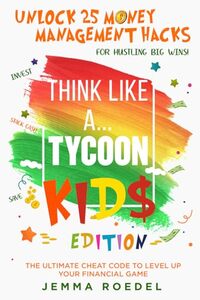 Think Like a Tycoon: Kids Edition: Unlock 25 Money Management Hacks for Hustling Big Wins! Stack Cash, Save, & Invest with the Ultimate Cheat Code to Leveling Up Your Financial Game!
Genre: Children's, Advice & How To, Business
Think Like a Tycoon: Kids Edition: Unlock 25 Money Management Hacks for Hustling Big Wins! Stack Cash, Save, & Invest with the Ultimate Cheat Code to Leveling Up Your Financial Game!
Genre: Children's, Advice & How To, Business
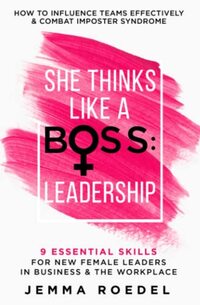 She Thinks Like a Boss : Leadership: 9 Essential Skills for New Female Leaders in Business and the Workplace. How to Influence Teams Effectively and Combat Imposter Syndrome
Genre: General Nonfiction, Business
She Thinks Like a Boss : Leadership: 9 Essential Skills for New Female Leaders in Business and the Workplace. How to Influence Teams Effectively and Combat Imposter Syndrome
Genre: General Nonfiction, Business
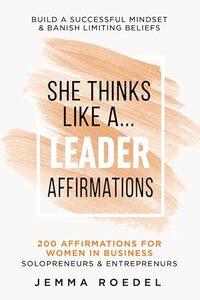 She Thinks Like a Leader: Affirmations: 200 Affirmations for Women in Business, Entrepreneurs, Solopreneurs. Build a Successful Mindset for Positive Thinking, ... Limiting Beliefs (She Thinks Like a Boss)
Genre: Advice & How To, General Nonfiction, Business
She Thinks Like a Leader: Affirmations: 200 Affirmations for Women in Business, Entrepreneurs, Solopreneurs. Build a Successful Mindset for Positive Thinking, ... Limiting Beliefs (She Thinks Like a Boss)
Genre: Advice & How To, General Nonfiction, Business
